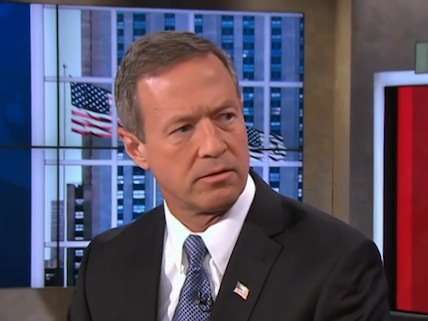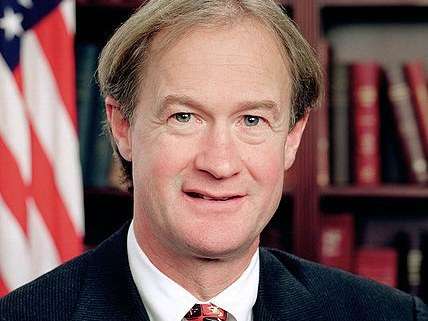Tonight's Democratic Debate: Your Guide to the Also-Rans
What Martin O'Malley, Jim Webb, and Lincoln Chafee have to say about the issues
In Las Vegas tonight, frontrunner Hillary Clinton will debate her most potent challenger for the Democratic presidential nomination, Vermont Sen. Bernie Sanders. She will also debate three other guys: former Maryland govenor Martin O'Malley, former Virginia senator Jim Webb, and former Rhode Island governor and senator Lincoln Chafee. None of those three is getting more than 1 percent in the current RealClearPolitics polling average, but between them they'll occupy 60 percent of the stage (*), so viewers should get a good opportunity to hear their plans for the country, assuming CNN doesn't spend too much of the evening asking the candidates what their favorite casseroles are or whether they'd rather be Elvis or a panda.
And what are those three would-be presidents likely to say? Here are some of the ideas they've already outlined, organized by subject matter:
Foreign Policy
O'Malley: Even when he's going out of his way to talk about foreign policy, Martin O'Malley sometimes gives the impression he'd rather be talking about anything other than foreign policy—he frequently uses the subject as a springboard for discussing climate change, international trade, and other global topics that are not directly connected to war and peace. Nonetheless, he was an opponent of the Iraq war, and he has criticized the Libyan intervention that Clinton championed. At his June speech to the Truman National Security Project he announced both that Washington should "be more engaged with the world around us, not less" and that "we must avoid mission creep—and be mindful that American boots on the ground can be counter-productive to our desired outcome." Essentially, O'Malley promises an America that remains extremely active around the world but drops fewer bombs in the process.
On questions of homeland security, O'Malley has called for more intelligence-sharing among American cities, for more stringent cybersecurity, and for "community partnerships to counter violent extremism," among other measures. Earlier this year, as Sen. Rand Paul (R-Ky.) played hardball during the debate over renewing the PATRIOT Act, O'Malley warned that Paul's "obstructionism" could make us "less safe."

Webb: In an earlier life, Webb served as Ronald Reagan's secretary of the Navy. That may make you expect him to be a hawk, but when he switched parties and campaigned for the Senate in 2006, he ran as a fierce opponent of the Iraq war. Since then, his record has been a mixture of hawkish and dovish stances—opposing the Libya war but also reacting skeptically to Obama's Iran deal—with a frequently expressed theme that America's foreign-policy focus should be on eastern Asia, not the Middle East.
The foreign policy issue page on Webb's website builds to an admonition to "NOT OCCUPY TERRITORY," adding: "We already have terrain to defend—the United States and our outposts overseas—and we cannot afford to expand this territory in a manner that would simply give the enemy more targets." He wraps up with this: "If a treaty does not obligate us, if American forces are not under attack or under threat of imminent attack, if no Americans are at risk, the President should come to the congress before he or she sends troops into Harm's Way."
Chafee: Chafee was the only Republican in the Senate to vote against the Iraq War—like Webb, Chafee is a party-switcher—and he has said he's running to keep Iraq on the public's mind. His website promises to "end drone strikes, torture of prisoners, and warrantless wiretaps." It also says he wants to work with the U.N. "to pursue strategic international agreements that reduce tensions, increase security, attack climate change, and promote civil liberties and fair trade."
Trade
O'Malley: O'Malley has been a vocal opponent of the Trans-Pacific Partnership (TPP). While not opposed to trade pacts per se, he says he will only back agreements that are negotiated openly, that prohibit currency manipulation and "hold cheaters accountable," that set and enforce stronger labor and environmental regulations, that do not weaken financial regulations, that do not strengthen patent laws in ways that make medicines unaffordable, that require strong rules of origin, and that "support investment in the U.S. economy." He also opposes any provisions that would allow businesses to use dispute settlement proceedings to roll back government policies they dislike.
Webb: Webb has also been skeptical about the TPP, as he usually (but not invariably) is about trade deals. He has not offered an O'Malley-style list of the elements a pact would require to get his support.
Chafee: Chafee supports the TPP, and he has a history of backing trade agreements.
Immigration

O'Malley: O'Malley supports the DREAM Act and comprensive immigration reform, and he has been more enthusiastic than the other candidates about allowing more Syrian refugees into the United States. He says he would close the most inhumane immigrant detention centers, would "limit detention to only those who pose a clear threat to public safety," would expand due process protections for people caught in the enforcement system, and would make it easier for local police departments to opt out of the business of enforcing federal immigration laws. He would also grant more waivers to would-be immigrants who are barred from entering the U.S. because they were previously here illegally, would make it easier and cheaper for lawful permanent residents to become citizens, and would have the Department of Homeland Security "provide immediate relief from deportation, with work authorization, to all individuals covered by the Senate's comprehensive immigration reform proposal." And he wants the people eligible to stay in the country under the Deferred Action for Childhood Arrivals program—basically, undocumented immigrants who came here as kids—to have access to Obamacare.
Webb: When he entered the race, Webb highlighted immigration reform as one of the topics he hoped to tackle. But he has been rather vague on the subject while campaigning.
Chafee: Chafee's policy page notes that he co-sponsored the original DREAM Act. It goes on to reprint that bill's text, so I guess it's a good guide to what he'd like to do in office.
Domestic economic policy
O'Malley: O'Malley has endorsed expanded Social Security benefits, a $15/hour minimum wage, tighter financial regulation, universal childcare, greater power for labor unions, and a grab bag of policies intended to make college more affordable, including an increase in Pell grants and a freeze in tuition rates.
Webb: Webb wants to put more people to work on infrastructure projects, and he says he'd "simplify the tax code, including reducing the corporate tax rate in exchange for eliminating numerous loopholes." He would like "to examine shifting our tax policies away from income and more toward consumption." Like O'Malley, he talks a lot about inequality, but he hasn't offered as many specific policies that he says would reduce it.

Chafee: Chafee wants a $10.10 minimum wage. (The $15 favored by O'Malley, Chafee explains, "could have a significant adverse effect on small businesses.") He also wants to spend more money on Head Start and Pell grants, to expand paid medical leave, to fight gender-based wage discrimination with a Paycheck Fairness Act, and to "work for a fair tax structure that removes excessive loopholes and tax cuts for wealthy citizens and corporations."
Criminal justice reform
O'Malley: From a civil libertarian perspective, Martin O'Malley arguably has the worst criminal-justice record in the field. (The NAACP and ACLU got an $870,000 settlement out of the City of Baltimore for unconstitutional arrests conducted while he was mayor.) Apparently eager to put all that behind him, the candidate has endorsed a host of changes aimed at making the system more humane, including civil forfeiture reform, the elimination of mandatory minimum sentences for low-level drug offenses, an end to the sentencing disparity between crack and powder cocaine, the use of body cameras to make law enforcement more transparent, more independent investigations of police misconduct, a national standard for the use of police force, an end to the death penalty, an end to solitary confinement for juveniles, much less solitary confinement for adults, the restoration of felons' voting rights, a phase-out of federal for-profit prisons, and steps that would make it easier for the feds to bring civil rights charges. He would also require all police agencies "to report data on all police-involved shootings, custodial deaths, discourtesy complaints, and use of excessive force." And he wants more job-training programs for former prisoners, more money for drug treatment, and more money for public schools—the latter being included on his criminal-justice issue page on the grounds that it will make it easier to hire counselors and social workers and thus, he believes, make school discipline less punitive.
O'Malley was unenthusiastic about decriminalizing marijuana when he was governor, though he did reluctantly sign a decrim bill after the legislature passed it. His rhetoric has been more favorable on the campaign trail: He has called for making pot a Schedule II rather than Schedule I drug, and he has held a sympathetic "marijuana legalization listening session" in Colorado. "I'm not there yet," he said afterward, "but I am watching very closely what's happening."
Webb: Webb is the one candidate in the race besides Rand Paul on the Republican side who can credibly claim to have been deeply interested in criminal justice reform before it was a trendy topic: He was talking about the problems of mass incarceration nearly a decade ago. It is now one of the five main issue areas on his website. But he has not offered an O'Malley-style list detailing the specific changes he'd like to make.
Chafee: Chafee has said little about criminal justice reform.
Gun rights
O'Malley: O'Malley is an enthusiastic advocate of new gun controls, calling for a national firearms registry, expanded background checks, more inspections of gun dealers, a fingerprint-based license for gun buyers, an "assault weapon" ban, a federal law preventing anyone under 21 from owning or possessing a gun, and a change to the law that would allow shooting victims to sue firearm manufacturers, among other changes. He also wants to enhance the penalties for illegal gun sales, so his newfound interest in criminal justice reform evidently has its limits.
Webb: Webb earned high marks from the NRA when he was in the Senate. His most notable comment about firearms this year came after the shootings at two Marine recruitment offices in Chattanooga, when he decried "the policies that exposed our people in so many different places, that don't allow them to defend themselves." Specifically, he'd like members of the military to be allowed to carry guns without official permission.
Chafee: From Chafee's website: "I believe in common sense adherence to the Second Amendment." Hopefully we'll find out tonight what exactly that means.
(* All right, all right: not counting all the empty space or the moderators.)


Show Comments (15)